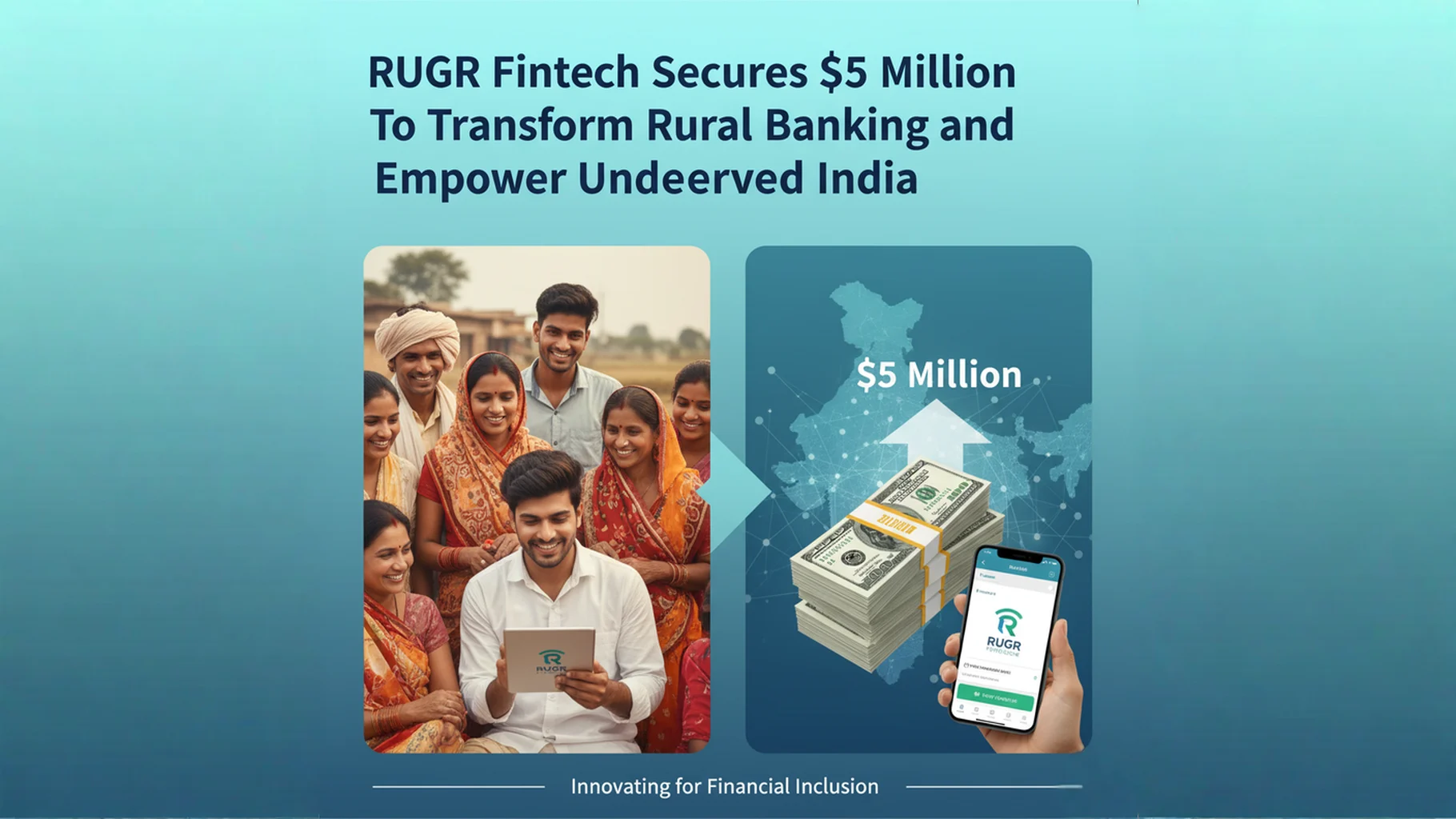Author: Aarya Shah | EQMint
In a significant milestone for India’s fintech ecosystem, Bengaluru-based RUGR Fintech has successfully raised $5 million in pre-Series A funding from Mauritius’ Vikasa India EIF I Fund, valuing the startup at $25 million. Founded in December 2024, RUGR is building digital-first solutions that specifically target rural financial inclusion, a sector that has long been underserved by mainstream banking institutions.
The funding marks a strong validation of RUGR’s mission: to bring advanced digital banking tools to rural India, empowering local banks, cooperatives, and microfinance institutions to modernize their services and extend financial empowerment to millions living in remote regions.
Bridging the Rural-Urban Divide in Banking
India has made substantial progress in expanding its financial sector over the last decade, yet the rural-urban divide in banking remains stark. While urban populations enjoy access to a range of digital banking services, many rural citizens still rely on manual processes, cash-based transactions, and limited access to financial institutions.
RUGR aims to bridge this divide by offering customized digital solutions for rural banks and cooperatives. The platform is designed to simplify lending, improve access to credit, and provide real-time banking solutions even in regions with limited connectivity. By focusing on these gaps, RUGR positions itself not just as a fintech company but as a catalyst for rural financial empowerment.
Strategic Investment and Valuation
The $5 million raised in this round will play a crucial role in scaling RUGR’s technology and expanding its reach. With a post-investment valuation of $25 million, the company is being closely watched by investors and industry experts alike.
Speaking on the investment, representatives from Vikasa India EIF I Fund noted that RUGR has the potential to transform rural banking infrastructure and bring millions into the fold of modern finance. They highlighted the startup’s ability to merge innovation with practicality, ensuring its solutions remain relevant and accessible to rural communities.
Digital Tools for a Rural Revolution
At the heart of RUGR’s offerings are digital banking tools tailored for institutions such as cooperative banks, credit societies, and small-scale lenders. These tools are designed to:
-
- Automate lending processes, reducing paperwork and delays.
-
- Enable digital payments and seamless mobile transactions.
-
- Strengthen data-driven credit assessments, helping banks extend loans more responsibly.
-
- Provide real-time analytics and dashboards for better decision-making.
By focusing on these functions, RUGR empowers financial institutions to serve rural customers more efficiently, while also increasing transparency and accountability.
Vision for Financial Inclusion
The startup’s vision goes beyond technology—it is deeply rooted in financial inclusion and empowerment. RUGR recognizes that access to banking services can unlock new opportunities for rural populations, from securing loans for agriculture to supporting small businesses and providing women entrepreneurs with access to credit.
With this funding, RUGR plans to expand its operations to multiple states in India, working closely with local cooperative banks and government-backed financial entities. The aim is to create a sustainable ecosystem where rural communities are not left behind in India’s digital financial revolution.
Industry Context and Growth Potential
India’s fintech industry is one of the fastest-growing in the world, with projections suggesting a valuation of over $150 billion by 2025. However, much of this growth has been concentrated in urban centers, focusing on consumers with easy access to smartphones, high-speed internet, and established banks.
RUGR represents a new wave of fintechs that are shifting their attention to the rural economy—a market that is both vast and untapped. With nearly 65% of India’s population residing in rural areas, the potential for digital banking solutions is immense. Analysts suggest that startups like RUGR could play a pivotal role in boosting India’s overall financial inclusion index.
Challenges Ahead
Despite its promising start, RUGR faces challenges common to fintechs working in rural areas. These include:
-
- Limited internet penetration in certain regions.
-
- Low levels of digital literacy among rural customers.
-
- Resistance to change from institutions accustomed to traditional methods.
However, RUGR is addressing these challenges through local partnerships, training programs, and simplified user interfaces that make adoption easier for both banks and customers.
The Road Ahead
Looking forward, RUGR aims to use the fresh capital to:
-
- Expand product development, integrating AI-driven tools for lending and credit assessments.
-
- Build stronger partnerships with cooperative banks and microfinance institutions across India.
-
- Strengthen its workforce by hiring top talent in technology and rural outreach.
-
- Enhance financial literacy initiatives to ensure rural populations can fully benefit from digital tools.
With these strategic initiatives, RUGR is positioning itself as a key driver of inclusive growth in India’s fintech sector.
Conclusion
The $5 million funding round not only provides RUGR with the resources it needs to scale but also shines a spotlight on the untapped potential of rural fintech in India. By leveraging technology to create tailored solutions for rural banks and cooperatives, RUGR is paving the way for a future where financial empowerment is not limited to urban areas but becomes a reality for millions of rural citizens.
As India continues its journey toward becoming a digitally empowered economy, startups like RUGR are ensuring that no community is left behind.
Disclaimer: This article is based on information available from public sources. It has not been reported by EQMint journalists. EQMint has compiled and presented the content for informational purposes only and does not guarantee its accuracy or completeness. Readers are advised to verify details independently before relying on them.









